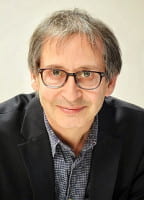“ Topological scaling laws and the statistical mechanics of evolution“
Speaker: Prof. Nigel Goldenfeld (Virtual), University of California San Diego, CA, USA
Date: Friday, September 29, 2023
Time: 3:00 – 4:45pm
Location: ISB 431 (In-person)
For the last 3.8 billion years, the large-scale structure of evolution has followed a pattern of speciation that can be described by branching trees. Recent work, especially on bacterial sequences, has established that despite their apparent complexity, these so-called phylogenetic or evolutionary trees exhibit two unexplained broad structural features which are consistent across evolutionary time. The first is that phylogenetic trees exhibit scale-invariant topology, which quantifies the fact that their branching lies in between the two extreme cases of balanced binary trees and maximally unbalanced ones. The second is that the backbones of phylogenetic trees exhibit bursts of diversification on all timescales. I present a coarse-grained statistical mechanics model of ecological niche construction coupled to a simple model of speciation, and use renormalization group arguments to show that the statistical scaling properties of the resultant phylogenetic trees recapitulate both the scale-invariant topology and the bursty pattern of diversification in time. These results show in principle how dynamical scaling laws of phylogenetic trees on long time-scales may emerge from generic aspects of the interplay between ecological and evolutionary processes, leading to scale interference.
Finally, I will argue that these sorts of simplistic, minimal arguments might have a place in understanding other large-scale aspects of evolutionary biology. In particular I will mention two questions where we do not have even a qualitative understanding let alone a quantitative one: (1) the spontaneous emergence of the open-ended growth of complexity; (2) the response of evolving systems to perturbations and the implications for their control. Even though biology is intimidatingly complex, “everything has an exception”, and there are a huge number of undetermined parameters, statistical physics reasoning may lead to useful new insights into the existence and universal characteristics of living systems.
Work performed in collaboration with Chi Xue and Zhiru Liu and supported by NASA through co-operative agreement NNA13AA91A through the NASA Astrobiology Institute for Universal Biology.
About the speaker:

Nigel holds the Chancellor’s Distinguished Professorship in Physics and joined UCSD in Fall 2021 after being at the University of Illinois at Urbana-Champaign from 1985-2021. Nigel’s research spans condensed matter theory, the theory of living systems, hydrodynamics and non-equilibrium statistical physics.
Nigel received his Ph.D. from the University of Cambridge (U.K.) in 1982, and for the years 1982-1985 was a postdoctoral fellow at the Institute for Theoretical Physics, University of California at Santa Barbara. From 1985-2021, Nigel was in the Department of Physics at the University of Illinois at Urbana-Champaign, where he eventually held the position of Swanlund Endowed Chair and Center for Advanced Study Professor of Physics. He also led the Biocomplexity Group at the Institute for Genomic Biology, and founded the Institute for Universal Biology there, which was part of the NASA Astrobiology Institute from 2013-2019. In 1996, Nigel co-founded NumeriX, a company that provides high-performance software for the derivatives marketplace. Selected honours include: Alfred P. Sloan Foundation Fellow, University Scholar of the University of Illinois, the A. Nordsieck award for excellence in graduate teaching and the American Physical Society’s Leo P. Kadanoff Prize (2020). Nigel is a Fellow of the American Physical Society, a Fellow of the American Academy of Arts and Sciences and a Member of the US National Academy of Sciences.
Recording of the talk:
